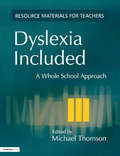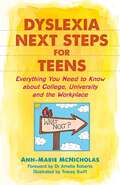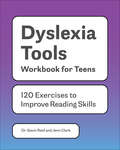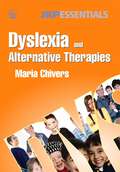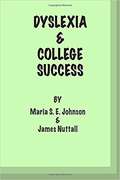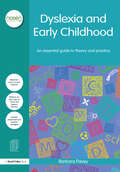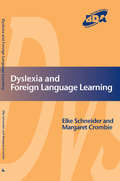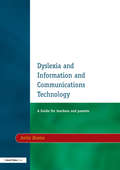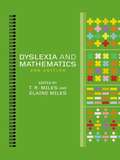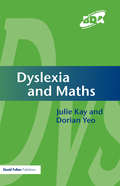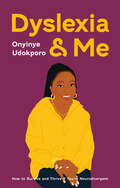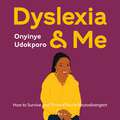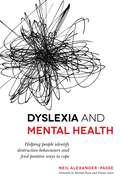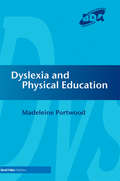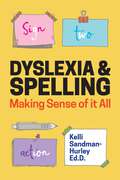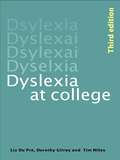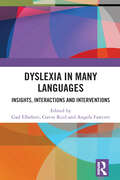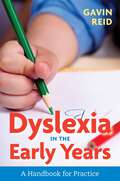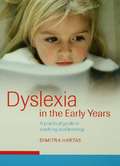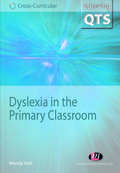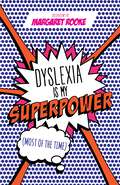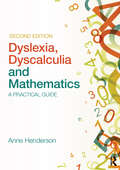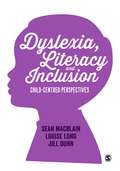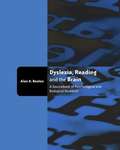- Table View
- List View
Dyslexia Included: A Whole School Approach
by Michael ThomsonThis practical book provides teachers with techniques and suggestions to help dyslexic pupils. Written by a team of experienced practitioners who work in a specialist school, it offers clear guidance and tried and tested strategies to help those who need support in this area. The book addresses reading and spelling difficulties and also other aspects of pupils' learning difficulties, including: accessing the curriculum; dyspraxia and motor development problems; learning mathematics; the use of ICT; developing phonological coding; and understanding dyslexics' behaviour. Teachers and teaching assistants working in specialist and mainstream primary and secondary schools should find the book useful. It is also relevant to those doing specialist courses in dyslexia.
Dyslexia Next Steps for Teens: Everything You Need to Know about College, University and the Workplace
by Ann-Marie McNicholasWritten for 14+ year olds, this accessible book empowers young people with dyslexia to make a smooth transition to college, university or the workplace. An engaging and informative guide, it will help you plan and make decisions about the next stage of your education or employment.Ann-Marie McNicholas, who has worked with young people with dyslexia for many years, answers the questions that you will have as you plan for life at university or college. She covers the differences between school and college and university, lists the different types of dyslexia assessment available and gives you simple, tried-and-tested tips to help you to manage your time, your workload and your revision. Beyond information about further and higher education, the book is full of advice on preparing for the next stage in your life, such as moving into the workplace.A must-read pocket guide for teenagers with dyslexia and an essential resource for parents, teachers, SENCOs, career advisers, and anyone else involved in supporting learners with dyslexia to make a successful transition to further education and the world of work.
Dyslexia Tools Workbook for Teens: 120 Exercises to Improve Reading Skill (Learn to Read for Kids with Dyslexia)
by Gavin Reid Jenn ClarkBoost confidence and reading skills with dyslexia tools for teensReading comprehension is a crucial skill for students to practice, especially students with dyslexia. The Dyslexia Workbook for Teens provides practice and encouragement for kids ages 12 to 16, with 125 activities that focus on learning big words, prefixes and suffixes, word recognition, language fluency, and more.The dyslexia tools in this book support teens as they:Learn independently—Teens can comfortably practice whenever and however they prefer with this collection of dyslexia tools they can work on by themselves.Explore a range of exercises—Keep students interested with word charts, puzzles, fill-in-the-blanks, and other fun activities.Build self-assurance—As teens get better and faster at these exercises, they'll see for themselves how much they're capable of and feel more confident in their reading and language skills.Help middle and high school students in overcoming dyslexia with this book of skill-boosting activities.
Dyslexia and Alternative Therapies
by Maria Chivers'A good book about how alternative therapies can help dyslexia. It mentions each therapy individually and explains what it is, how it works, how many sessions are needed, who will benefit, and if it can be done at home.' - Education Otherwise This comprehensive book offers clear and balanced information on a range of alternative therapies for individuals with dyslexia, dyscalculia, dyspraxia or ADHD. The author provides an overview of each therapeutic option, method of use and case examples, covering nutritional supplements, massage, acupuncture and hypnotherapy, among others. She also includes contributions from experienced alternative therapists, offering an insider's view of what works and what does not. Her objective approach will enable the reader to make an informed choice from among the many available options. A bibliography and a list of useful contacts are also provided. This book is a key resource for anyone interested in exploring alternative therapy approaches to dyslexia and related difficulties, particularly for parents of people with dyslexia, dyslexics themselves and the professionals who work with them.
Dyslexia and College Success
by Maria S.E. Johnson James NuttallWritten by two individuals with dyslexia and dysgraphia who have successfully navigated the college experience, it provides a unique first hand perspective on attending college with these limitations.
Dyslexia and Early Childhood: An essential guide to theory and practice (nasen spotlight)
by Barbara E. PaveyTaking a developmental approach, this accessible text addresses the ever increasing interest in identifying the characteristics of dyslexia in young children and reflects on the best way to reach and support these learners. Drawing upon current research, the author considers our current understanding of dyslexia and calls upon best practice to advise professionals, students and family members alike who seek to fulfil the potential of young children with, or showing the signs of, dyslexia. This book considers key topics explored in current best practice and dyslexia research, including: the importance of the role of speaking, hearing and understanding language dyslexia in relation to other languages and orthographies dyslexia and overlapping characteristics, particularly dyspraxia the role of play identifying and assessing dyslexia in the early years. Adopting a dyslexia-friendly position, Barbara Pavey acknowledges the ethics associated with a social model of disability, so that the focus is upon modifying teaching and learning, and respecting the views of children and parents throughout. This book includes assessment and practice strategies, good practice points, helpful ideas, first-hand narratives of dyslexia, pointers for further reading, resources and online tools, and will be of enormous practical use to anyone supporting a young child with potential or diagnosed dyslexia.
Dyslexia and Foreign Language Learning
by Elke Schneider Margaret CrombieOffering strategies and techniques for teaching modern foreign languages - an often severely challenging subject for pupils with dyslexia - this book is specifically designed to meet the needs of the busy subject specialist teacher looking for guidance on supporting pupils.
Dyslexia and Information and Communications Technology: A Guide for Teachers and Parents
by Anita KeatesEffective use of ICT can enhance many dyslexic pupils' access to the curriculum, but it has to be used appropriately. This book will be useful to all teachers, teaching assistants, SENCOs and parents who are keen to have practical advice on how to help a child in this way. Full of strategies and suggestions that are based on the author's extensive classroom experience, this accessible book is suitable for the ICT novice and more advanced user alike. The book has been fully updated to guide the user through the maze of hardware and software currently available, identifying those most suitable for different Key Stages and curriculum subjects as well as providing ICT solutions to the problems of assessing and screening for dyslexia.
Dyslexia and Mathematics
by Elaine Miles T. R. MilesIn this revised and fully updated second edition of the classic bestselling text, the formidable team of expert contributors, inluding Professor Tim Miles OBE, draw on their extensive experience in the field. The outcome is a wealth of material based on individual case studies supported by practical and accessible teaching strategies. The new material includes: * discussion of the latest thinking in the field - ideas on dyscalculia* information from a survey of primary school children* guidance on suitable testing material* innovative contributions on practice. The long awaited second edition of Dyslexia and Mathematics is unique in terms of its coverage and authority, and is a must-buy text for teachers, student teachers and special needs co-ordinators.
Dyslexia and Maths
by Dorian Yeo Julie KayThis concise text helps the reader to understand why dyslexics find maths difficult and offers practical ideas for supporting them most effectively. It explains which areas of maths dyslexics tend to have particular difficulty with, assesses current teaching philosophies and methods, describes a framework of general learning principles that allow dyslexics to make progress in maths, and outlines a number of specific and effective teaching recommendations. The book helps teachers at primary and secondary levels to better understand the maths performance of dyslexics and gives them an overview of the ways in which dyslexics can best be supported in all aspects of maths learning.
Dyslexia and Me: How to Survive and Thrive if You’re Neurodivergent
by Onyinye UdokporoThroughout my life I have been told directly and indirectly that dyslexia is found in particular people... [In fact] dyslexia can be found in someone like me. It isn't just 'okay' but something to be proud of. This book has been written because I want people to know that dyslexia can be found in people of every colour, creed, or circumstance.In this book, rising star entrepreneur Onyinye Udokporo shares her story of growing up dyslexic in a society where neurodivergence was always presented as a white male issue.Onyinye discusses her experience of being diagnosed at 11 years old, starting a business the following year, gaining a scholarship to a prestigious boarding school and going on to complete two degrees by the age of 22, while also being honest about the difficulties she faced throughout including with bullying and anxiety. She shares the tips she picked up over the years for thriving with dyslexia and the strategies she used to overcome her difficulties in reading and writing well, staying organised and speaking with confidence.Illuminating wider issues of systemic racism in the educational sector and providing a timely reminder that dyslexia can be found in any community and culture, this is an empowering story of surviving and thriving in the face of adversity.
Dyslexia and Me: How to Survive and Thrive if You’re Neurodivergent
by Onyinye UdokporoThroughout my life I have been told directly and indirectly that dyslexia is found in particular people... [In fact] dyslexia can be found in someone like me. It isn't just 'okay' but something to be proud of. This book has been written because I want people to know that dyslexia can be found in people of every colour, creed, or circumstance.A survival guide on being young and dyslexic by inspiring rising star entrepreneur and speaker Onyinye Udokporo, combining her own personal story with political and cultural insights, and practical tips and advice.In this audiobook, rising star entrepreneur Onyinye Udokporo shares her story of growing up dyslexic in a society where neurodivergence was always presented as a white male issue.Onyinye discusses her experience of being diagnosed at 11 years old, starting a business the following year, gaining a scholarship to a prestigious boarding school and going on to complete two degrees by the age of 22, while also being honest about the difficulties she faced throughout including with bullying and anxiety. She shares the tips she picked up over the years for thriving with dyslexia and the strategies she used to overcome her difficulties in reading and writing well, staying organised and speaking with confidence.Illuminating wider issues of systemic racism in the educational sector and providing a timely reminder that dyslexia can be found in any community and culture, this is an empowering story of surviving and thriving in the face of adversity. (P) 2022 Jessica Kingsley Publishers
Dyslexia and Mental Health: Helping people identify destructive behaviours and find positive ways to cope
by Michael Ryan Neil Alexander-Passe Pennie AstonDyslexia is a complex condition that affects not only learning but every part of life. Experience or fear of social stigma can lead people with dyslexia to camouflage the difficulties they face, to withdraw and to adopt negative coping strategies, particularly if they lack adequate support, identification and intervention. This can have lasting impact on their emotional health. Neil Alexander-Passe is an experienced researcher and a special needs teacher in secondary mainstream education. He also has dyslexia. Neil uses his personal and professional experience to shed light on the complexities surrounding dyslexia and examines psychological theories such as ego-defence mechanisms and learned helplessness that reveal how people deal with its emotional impact. He offers guidelines and advice, illustrated with real life examples, about how to help people with dyslexia avoid harmful coping strategies and learn to deal with stress, anxiety and low self-esteem in more effective and psychologically positive ways. This book will help educational and clinical psychologists, teachers, mental health specialists, counsellors and therapists understand the emotional complexities of dyslexia.
Dyslexia and Physical Education
by Madeleine PortwoodMuch research has focused on dyslexia and co-ordination. This book examines the literature and provides a framework to support pupils with dyslexia, not only during PE lessons but in less structured environments, for example during break time when pupils are likely to be involved in physical activities.
Dyslexia and Spelling: Making Sense of It All
by Kelli Sandman-HurleyWritten by an authority in the dyslexia field, this is the first accessible guide to the close interplay of spelling and dyslexia. Kelli Sandman-Hurley talks the teacher or parent through why kids with dyslexia find spelling so hard, and what we can learn from the spelling mistakes in their writing samples. Introducing key terminology around morphemes (smallest unit of meaning in words) and phonemes (smallest contrastive units in language) in an accessible and clear way, Sandman-Hurley goes on to explain how we can identify, and learn from, kids' spelling miscues, and use them to further inform our teaching and instruction. Shedding much-needed light on an under-explored tool for classroom or home learning, Dyslexia and Spelling is essential reading for teachers and parents alike.
Dyslexia at College
by T. R. Miles Dorothy Gilroy Elizabeth Ann Du PreThis fully updated third edition contains practical and useful advice that will be invaluable for students with dyslexia, their parents and all of those involved in teaching and supporting them in their studies. Including the latest research into dyslexia, changes in legislation and information technology and the real-life experiences of six former Bangor students this book will: • guide students through the process of applying for university, suggesting strategies for general organisation and for particular aspects of study • outline how to get the best personally and academically from higher education • give practical advice on setting up and using support facilities (both human and technological) • be an accessible text for mainstream lecturers and tutors who need to be aware of the implications of the Disability Discrimination Act. New chapters include 'Dyslexia plus', giving information on dyspraxia, attention disorders, Asperger's syndrome, and the more controversial 'dyscalculia'. ‘Out of College and into Work’ gives advice for students on the challenges they face after graduation.
Dyslexia in Many Languages: Insights, Interactions and Interventions
by Gavin Reid Gad Elbeheri Angela FawcettDyslexia in Many Languages thoroughly investigates the fascinating relationship between dyslexia and language systems by highlighting research and practice initiatives around the world.Focusing on how dyslexia manifests itself in non-English languages, readers of this text will enhance their understanding and appreciation for the role of language systems and the interplay they have with dyslexia, assessment and intervention. Experienced and expert contributors around the world consider how dyslexia is defined, assessed, and supported in their native country, drawing on the linguistic features of that language and how this affects monolingual, bilingual and multilingual speakers. This book also compares dyslexia in different languages and questions what are the universal lessons that we can learn from comparing dyslexia in different languages and do different languages affect its prevalence and incidence? The editors consider the implications for classroom practice, such as learning and teaching challenges, the social emotional and educational impact on the child as a learner and considers the various sides of the educational process of students with dyslexia in different languages.This volume is essential reading for teachers and psychologists who deal with a large number of students and patients coming from different language backgrounds. Researchers and educators interested in dyslexia in different languages will also find its contents useful and relevant in their learning and work contexts.
Dyslexia in the Early Years: A Handbook for Practice
by Gavin ReidResearch has shown that early identification and intervention is crucial and can in fact minimise, and may even prevent, the challenges of dyslexia from becoming too detrimental at later stages of education. This book offers both research insights and practical guidance for teachers working in Early Years settings on how to create resource materials that would be suitable for the development of children with dyslexia. Beginning with a contextual note on the key difficulties faced by children at risk of dyslexia, the book takes the reader through the processes of identification and diagnosis, before offering ideas on how to tailor classroom materials for these students. The book's resource materials are designed to target areas such as reading, spelling, numeracy, language skills, social and emotional development, and problem solving skills.
Dyslexia in the Early Years: A Practical Guide to Teaching and Learning
by Dimitra HartasPacked full of activities, real-life case studies, tasks and suggestions, this informative book will equip teachers with the kind of practical knowledge needed to teach young children with dyslexia effectively. Tackling the subject in a clear and realistic way, the author encourages teachers to think critically in terms of the changing nature of special educational needs, and teaching and learning in early years. She addresses a variety of classroom issues, such as: assessment and identification of dyslexia summarising and commenting on current debates exploring the links between dyslexia, language, and social and emotional development the most effective instructional methods and teaching styles conducive to supporting pupils with dyslexia in early years settings. In addition the book considers the implications of current research for everyday classroom practice, makes recommendations for employing technologies and for accessing web-based information and resources.
Dyslexia in the Primary Classroom (Achieving QTS Cross-Curricular Strand Series)
by Wendy HallThis book is an important resource for all primary trainees. It provides an explanation of what dyslexia is and how it affects a child′s learning, suggests simple activities which can be used to screen children ready for referral and outlines some easy-to-follow activities addressing different learning styles. It is full of practical suggestions on how to teach reading, spelling and mathematics, develop writing and help with classroom organisation for children displaying difficulties in these areas. The Primary National Strategy is considered throughout and clear links are made to the Professional Standards for the Award of QTS.
Dyslexia is My Superpower (Most of the Time)
by Margaret RookeIn more than 100 interviews, children and young adults reveal their personal tips and tactics for honing the creative benefits of dyslexia, enabling them to thrive in school and beyond. Strategies include ways to develop confidence and self-belief. The contributors have outlined specific approaches they feel have helped them, and others that haven't. The book contains stunning illustrations by 8-18 year olds with dyslexia.The first-hand accounts are inspiring in the way they normalise dyslexia and reveal the many success stories. There is an additional section for professionals who work in education or special learning environments, with advice given by school students themselves.
Dyslexia, Dyscalculia and Mathematics: A practical guide
by Anne HendersonDyslexia, Dyscalculia and Mathematics will be an essential resource for teachers, classroom assistants, and SENCOs who help dyslexic and dyscalculic children with their understanding of mathematics. Written in an accessible style with helpful illustrations, this practical book reveals helpful ways in which to tackle both simple and complex concepts with students of all ages. This second edition has been updated to include references to using technology that will help children with dyslexia and dyscalculia reinforce their mathematical skills and also contains a number of photocopiable resources that can be used in the classroom. Written by Anne Henderson, who is experienced in teaching language and mathematics to pupils with dyslexia and dyscalculia, this book outlines current thinking in the field and shows how the research methods that have been proven as successful can be used with whole classes of children. This book encourages flexible methods and gives teachers the confidence to discuss alternative solutions with their pupils and help them achieve success. It is an ideal handbook for parent-teacher programmes and is also suitable for in-service training.
Dyslexia, Literacy and Inclusion: Child-centred perspectives
by Sean Macblain Dr Jill Dunn Louise LongThis book is about raising standards in literacy for children with dyslexia by putting the child at the centre of everything you do, focusing on wellbeing, and recognising the role that adults have to play in ensuring all children reach their potential. Concentrating on children in primary schools and early years settings the book looks at: Early intervention Pupil voice Working as a team New literacies Child-centred identification, assessment and provision Challenges for the inclusive school. Suitable for all those working with children with dyslexia this book contains strategies that can be easily adopted to academically and emotionally benefit the children you are working with.
Dyslexia, Literacy and Inclusion: Child-centred perspectives
by Dr Jill Dunn Louise Long Sean MacBlainThis book is about raising standards in literacy for children with dyslexia by putting the child at the centre of everything you do, focusing on wellbeing, and recognising the role that adults have to play in ensuring all children reach their potential. Concentrating on children in primary schools and early years settings the book looks at: Early intervention Pupil voice Working as a team New literacies Child-centred identification, assessment and provision Challenges for the inclusive school. Suitable for all those working with children with dyslexia this book contains strategies that can be easily adopted to academically and emotionally benefit the children you are working with.
Dyslexia, Reading and the Brain: A Sourcebook of Psychological and Biological Research
by Alan BeatonDespite the wealth of literature available on the subject of dyslexia, there is little that explores the subject beyond a single theoretical framework. The need for a comprehensive review of the literature by both researchers and practitioners from different fields and theoretical backgrounds is the central motivation behind Dyslexia, Reading and the Brain. By combining the existing fragmented and one-sided accounts, Alan Beaton has created a sourcebook that provides the much-needed basis for a more integrated and holistic approach to dyslexia.The book is divided into two sections: the first, The Cognitive Context, outlines the theoretical context of normal reading development and introduces the role of phonological awareness and the relation between dyslexia and IQ. Section two, The Biological Context, provides an explanation of the genetic background as well as exploring hormonal theories and the visual aspects of dyslexia.
